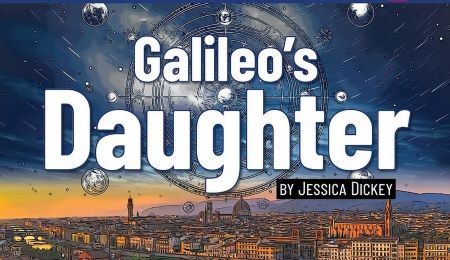GALILEO’S THEORIES WOULD PROVE
THAT THE SUN DOESN’T MOVE –
GALILEO’S DAUGHTER ALSO DOESN’T MOVE
It’s an intriguing notion: the ground-breaking scientist and astronomer Galileo Galilei, who defied the Catholic Inquisition to publish his observations regarding the movement of Earth around the sun, had a daughter who shared his intellectual curiosity. Dava Sobel’s 1999 biography of Suor Maria Celeste (1600–1634), Galileo’s Daughter: A Historical Memoir of Science, Faith, and Love, told against the backdrop of her father Galileo’s own career and challenges, was a Pulitzer finalist.
Diego Arciniegas and Caroline Kinsolving
As an illegitimate daughter, Maria Celeste was considered unmarriageable, and thus she was placed in a convent at the age of 13. For her book, Sobel drew on the 124 surviving letters Maria Celeste wrote to her father from the convent.
Central Square Theater (CST), co-producing with WAM Theatre, is presenting the New England premiere of Galileo’s Daughter by Jessica Dickey (The Rembrandt, The Amish Project) through December 8. Directed by Reena Dutt, the production ended at Shakespeare & Company in Lenox on November 3 before transferring to Cambridge.
Diego Arciniegas and Sandra Seoane-Serí
Part of the twentieth anniversary of Catalyst Collaborative@MIT, which bills itself as “the nation’s only on-going partnership between a professional theater company and a world-class research institution”, CST offers “Conversations”, opportunities to hear from noted physicists, historians, and theologians on the implications of the content of the play for the ways in which we see ourselves in the present moment. CST presents at least one play each season to bring art and science together, framed by efforts to examine the real-world implications of science for our future. These plays tend to focus on the achievements and struggles of marginalized and underrepresented people in the sciences, often with great success, as in Lauren Gunderson’s wonderful The Half-Life of Marie Curie in 2021.
Diego Arciniegas
Unfortunately, Galileo’s Daughter fails to deliver on the promise of this material. It’s not for lack of talent or effort. Quingan Zhang’s set evokes a life of curiosity and investigation within a Tuscan cave. Sandra Seoane-Serí shines as Maria Celeste; quick-change artist Diego Arciniegas is impressive in his transformations from Galileo to various Italian bureaucrats; and Caroline Kinsolving brings passion to her role as “The Writer”. Yet their work is not sufficient to overcome the many weaknesses of the script.
Caroline Kinsolving
The life of the seventeenth-century woman that drew me to this production is sadly subsumed to the fairly silly problems of The Writer. Despite having some sort of unspecified support from Harvard to see the letters in an archive in Florence, The Writer apparently has not arranged access and isn’t even sure where in Florence to go to find the letters. Too much of the action involves her efforts to negotiate a bureaucracy she doesn’t understand. Nor does she speak Italian (this is indicated by various characters literally shouting “Italian, Italian, Italian” at her — a technique that took me a while to comprehend and that was even more opaque to my companion. I wondered — given her apparent lack of Italian — what she planned to do with the letters once she found them.
Caroline Kinsolving and Sandra Seoane-Serí
At the end we are left wondering what it was that drew The Writer to seek out these letters (and by extension, what drew Dickey to this material). The parallels The Writer tries to claim between her own life and that of Maria Celeste strain our credulity and our sympathies. The strategy of having the two women chase one another around the set while echoing one another’s lines only add to the confusion.
Sandra Seoane-Serí and Diego Arciniegas
We sense all along that The Writer has suffered a recent disruption in her personal life. The nature of that disruption, revealed near the end of the play, is fairly mundane, at least as presented. It hardly mirrors the experiences of Maria Celeste, forced into the brutal living conditions of a convent and suffering the uncertainty of her beloved father’s fate at the hands of the then all-powerful Catholic Church, which convicted him of heresy and considered whether his punishment should involve the loss of his freedom or his life (Galileo agreed not to teach the heresy anymore and spent the rest of his life under house arrest). The crisis of faith and the need for courage suggested by Maria Celeste’s life is absent in this portrayal of a playwright on a poorly planned jaunt to Florence with no guiding star — or sun — to give meaning to her journey.
Diego Arciniegas and Sandra Seoane-Serí
photos by Maggie Hall
Galileo’s Daughter
Central Square Theater, 450 Massachusetts Avenue in Cambridge
in partnership with WAM Theatre
schedule varies; student matinee on Dec. 5
ends on December 8, 2024
for tickets, call 617.576.9278 ext. 1 or visit CST


{ 1 trackback }